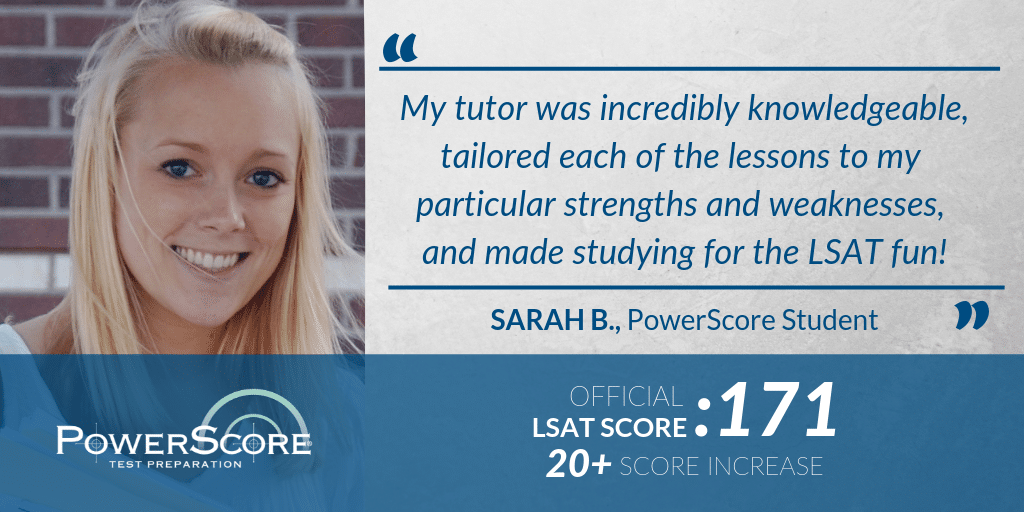As you head down the home stretch for your LSAT administration, you may be thinking investing in private tutoring. It’s a common question. For many students, it’s a perfect solution to achieve that final score push just before test day. From the prospective of our tutors, it’s incredibly fulfilling. You have the opportunity to connect with someone entirely dedicated to helping make your unique goal attainable.
You may be asking yourself: “What can I expect from my PowerScore tutor?” The short answer is “a lot.” You’re paying for a top-notch, premium service. At PowerScore our tutors embody our top two Core Values.
- To deliver the best test preparation imaginable.
- To connect with every customer and provide killer service.
Your PowerScore tutor will do everything possible to meet and exceed those two promises. Don’t take it from us, though. Over the years, students comment on our tutoring programs. If we can’t convince you, they likely can.
That said, this post is really about your role as a tutoring student. What should you do to get the most out of your tutoring experience?
Own It!
First, you need to own it. Some students choose tutoring because they are unsure of themselves and want to hand over the reins to someone else. I completely understand that impulse! While it’s okay perhaps to start your tutoring sessions with this attitude, taking responsibility for your own LSAT preparation will invariably get you the most out of tutoring. Don’t wait to get assignments from your tutor or rely on them to bring up topics for study. Instead, proactively take practice tests, select questions and concepts to cover, identify your weak spots, and think about possible solutions.
If you’re not in charge of your test preparation, you won’t have a clear understanding of what issues you need to address. You’ll end up attending an hour-long session with only a practice question or two to review. A successful tutoring student comes to a session highly prepared and organized with completed homework and consideration of how to move forward. Here’s an example of a mindset you should get into when starting a tutoring session:
I felt uncomfortable with the conditional rules in the third game of this test. Could you review with me the conditional reasoning topics pertinent to that game? Can you discuss the errors I made and suggest other games where similar concepts are being tested?
That type of question is music to any tutor’s ears because it shows preparedness and an eagerness to learn. It demonstrates that you are being an advocated for your own success. The tutors response can directly address your concerns and expand to related concepts, revealing additional ideas ripe for growth. Could that also occur with a less engaged student? Absolutely. But it would likely take longer and thus be less efficient for the student.
Of course, this doesn’t imply a lack of guidance! On the contrary, this proactive approach allows your tutor’s advisement to be more effective, more appropriate, and ultimately more impactful.
Change Your Perspective
Next, be open to challenging your views about the test. You may be thinking that seems counterintuitive, but there’s a reason for this. There are students who pay for tutoring with an LSAT expert yet refuse to try certain techniques the tutor recommends. For example, we know that reading the question stem first in Logical Reasoning questions is a hindrance, not a help. Yet some tutoring students will refuse to try a practice test where they commit to reading the stimulus first. Or, some students will balk at even testing out our Assumption Negation Technique, which provides a rare and powerful opportunity to double-check your work when doing Assumption questions.
This degree of stubbornness is akin to being terrified in a burning building but refusing to follow a firefighter’s instructions. The person clearly knows they are in a bad position. Even though their position is perilous, they takes comfort in the known and can’t bring themselves to move.
Give your tutor the benefit of the doubt. If you aren’t performing well, you may need to shake things up a bit. Be willing to work with your tutor and experiment with recommended techniques. Provide your tutor plenty of feedback, so they can know what is and isn’t working and make calculated adjustments as needed. You’d be surprised at the combination of factors that can go into a person’s LSAT score. Your tutor needs the context of your feedback to best prepare you for the test. Fortunately, for an expert tutor, more information clarifies the issues you’re facing.
Communication is Key
Finally, communicate, communicate, communicate. As you may have guessed from the two points above, communication is the key to getting the most out of tutoring. Let your tutor know how things are going, how you’re feeling, and what your concerns are. Stay in touch with updates between sessions. Remember, the person you’re working with is committed to your success, so knowing exactly what you’re up to before and after your discussions is welcome news! In short: your input and feedback are critical to helping your tutor help you. You’re a team, after all, and great teamwork is all about communication.
The decision to invest in LSAT tutoring is an important one. Make the most of your investment by taking responsibility for your preparation, being open to new approaches, and communicating early and often with your tutor as you progress.
Ready to Get Started?
Think you’re ready to jump into private tutoring? Our tutoring process is unique in that you don’t pay a dime until you’ve been matched with a potential tutor. This way you can figure out what you need from your tutor, what weaknesses you should focus on, and which tutoring package we offer works best for you.



Leave a Reply